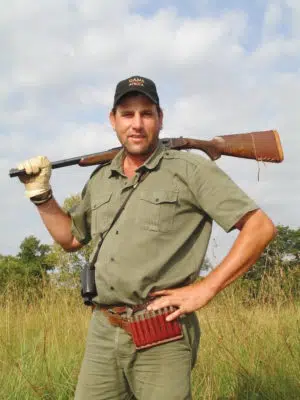
Note: Lion trophy fee is refundable in the unlikely event that a Lion is not successfully hunted !!
*** Observers are welcome on this dangerous game hunt at US$ 600 per day.
*** Rifle Rental is available @ US$ 750 for the duration of the hunting safari
Big Game Hunting Concession
The Selous Reserve is now known as Nyerere National Park, being a protected nature and wilderness reserve covering more than 21,000 square miles, packed with African game animals. The ecosystem within the Selous extends south from Tanzania into the Niassa Province of Northern Mozambique. The Niassa Province is another popular destination for African dangerous game hunts including big black maned Lions, Cape Buffalo, Leopard and Elephant.
In 1982, the Selous Reserve was classified as a World Heritage site owing to the high levels of biodiversity and vast undisturbed natural landscapes. The Kilombero River on this concession in the Selous provides 20 miles of river frontage. With access to this river system, “Aquatic Hunts” for Hippo and Crocodile are sought after for hunters completing Africa’s dangerous 7.
Habitat consists of rolling hills, brush, Miombo woodlands, and rocky outcrops. This area has some of the best hunting in Tanzania boasting an incredibly beautiful landscape. With the wide grasslands, game is plentiful with large herds of Cape Buffalo, Topi, Defassa Waterbuck, Oribi, and more.
Due to the fragility of the ecosystems within the Selous, human habitat is not permitted, and access is strictly controlled by nature conservation.
In Tanzania, you will be spoiled for choice when hunting Cape Buffalo. Tanzania has more than 400 000 Cape Buffalo and daily you will encounter herds in their hundreds. Looking for an “old scrum cap” Dagga boy, this hunt in Tanzania will provide you with the opportunity to find him and track him down.
Elephant hunts are also popular, with the Selous having a history of producing “big tuskers” and having healthy populations.
Safari Includes:
Bird shooting on this big game hunt is included in the quoted price. Geese, Duck, Francolin, and Helmeted Guinea fowl are on the list and five of each species may be targeted.
The point of entry into Tanzania will be flying to the city of Dar es Salaam. Depending on the time of arrival in Tazania, it is suggested to stay overnight in Dar es Salaam. To fly from the Unites States, reaching Tanzania in the city of Dar Es Salaam, the easiest and most common route involves connecting flights, with airlines like Ethiopian Airlines, Turkish Airlines, Qatar Airways and KLM being popular choices, often with stops in Istanbul or Amsterdam.
An alternative would be to fly to South Africa and land at Oliver Tambo International Airport. Airlink has regional flights from Oliver Tambo to Dar Es Salaam. Should hunters need to stay over in Johannesburg, we would suggest African Sky Boutique Hotel. The hotel is situated in close proximity to the airport, offers to/from transfers and can assist with firearm permits. For more information, see “Affiliate Services” in the listing below.
As Tanzanian game hunting grounds in the Selous are so remote, a charter flight will be needed which will take approximately one hour and take you directly to the concession. Please confirm arrangements with Jaco. Charter prices do fluctuate due to fluctuation of fuel costs.
The Selous Reserve in Tanzania is a malaria area, as are most northern areas of Africa. Your medical practitioner will prescribe preventative measures such as Doxycycline, Mefloquine, or Atovaquone. There are no compulsory vaccinations on this hunt, except for the routine vaccinations you would have received for Measles, Hepatitis, Polio, and Typhoid.
It is suggested to ensure that you have received “shots” in the last 10 years for the likes of Rabies and Tetanus. Packing a general antibiotic for flu etc. is also a great idea, medical assistance is far away and a small matter like a “cold/flu” can disrupt the safari.
Buffalo hunting in Tanzania is adrenaline and action-packed from start to finish. Tanzania has enormous buffalo with sustainable populations. You will be hunting following the traditions of the legendary hunters of yesteryear such as Selous, Bell, and Percival. The Cape Buffalo hunt will be on foot, in the sand and dust and the shot will be up close and personal, just the way hunting Cape Buffalo should be.
There will be plenty of Cape Buffalo to choose from, you will just need to track and walk him down. Do not shoot the first buffalo you see, unless you are absolutely certain “that’s the one, take it!”
On an African Buffalo hunt, a typical day hunting will be up early before sunrise, hot coffee or other choice of beverage, and a five-star breakfast, where after you will head out to look for fresh signs of Buffalo tracks or other activity. A hunting vehicle may be utilized to cover more ground. As this hunting safari includes Lion hunting, baits will need to be checked throughout the concession and will be included during the days activities.
Cape Buffalo hunts will leverage off the skills of some of the world’s finest trackers who will guide you to your dream Buffalo. These guys know Buffalo!

Having an in-depth knowledge of Buffalo shot placement is critical to ensure a successful hunt. Make the first shot count. A wounded Buffalo as we know is exceptionally dangerous. It takes one bullet to kill a Buffalo, another good many to convince the buffalo of the fact that he is dead.
Headshots are to be avoided unless the Buffalo is charging, then there will not be any other choice. Only a bullet to the brain will anchor a charging Buffalo at 10 yards.Your professional hunter will recommend access to the vitals via the broadside or frontal shot. When buffalo hunting, the animal does not always present the “perfect shot.” In these instances, a quartering towards or away shot may have to be considered to harvest the trophy buffalo.
On a Cape Buffalo hunt, you are going to need stopping power but choose a caliber that you can comfortably manage. When hunting in Africa, the minimum legal requirement is generally a .375 with a 300-grain tip. When Buffalo hunting, larger calibers such as a 416 Rigby, .458, or 458 Lott, or any double rifle such as a 500 NE are recommended.
The Selous Reserve has the highest concentration of big black maned Lions in all of Tanzania. Throughout the country Lions are being threatened by habitat loss, thus making available permits very limited and highly sought-after.
A CITES permit is required and only mature males over six years of age may be hunted. Lion hunting will take place using the baiting method and no Lion hunts are legally allowed to take place in Tanzania at night. Jaco and team have an extremely high rate of success.
When Lion hunting in Africa, just like on a Cape Buffalo hunt, make the first shot count. A wounded Lion is not to be messed with.
In preparation for the Lion hunt, ensure that you obtain a good understanding of the Lion’s anatomy. When perfecting Lion shot placement, know the heart sits a little further back. Consider the position of the vitals as the Lion reaches up stretching to a bait.
Hippo hunting is a underrated dangerous game hunting safari. These animals are massive with big bodies and tusks, happily being able to “chomp” a man in half with a single bite. Hippo tusks are for fighting, not feeding.
You will patrol the waterways of the Kilombero River seeking a suitable trophy. Hippo hunts will take place either when the Hippo is in the water or feeding on dry land. A wounded Hippo will either charge the hunter or flee to the safety of the water. It is advisable not to get in between a Hippo and the water unless you are planning to place a bullet between the eyes.

On the Hippo hunt and considering shot placement in the water, you will be able to place a bullet from the front between the eyes, or from the side between the ear and the eye. If the Hippo’s head is out of the water, you may be able to get a bullet into the neck vertebrae, but this will present a small target and this shot is not ideal ad there is too much room for error.
Should the Hippo be out of the water, place the bullet a third of the way up the front leg.
Accommodation in the Selous will be upmarket typical African-style tents. These luxury safari tents have en-suite bathrooms, hot and cold running water, and all the comforts expected when hunting in Tanzania.
Internet and Wi-Fi are also available and besides the excellent cuisine, at night you will be spoiled with cold beer, fine wines, and scotch. Hunting in Africa just does not get any better than this hunting safari.
This license allows for a variety of plains game and specialty animals, including tiny ten members and a large antelope. Many of these exotic species are endemic to Tanzania. Pay only the trophy fee.
This hunting license even caters to a few monkeys such as the Vervet Monkey (US$ 200), Blue Monkey (US$ 200) and the Olive Baboon (US$ 200)
Adding iconic species such as Niassa Wildebeest (US$ 975) and Lichtenstein Hartebeest (US$ 975) should definitely also be considered.
If a nocturnal hunt is “up your alley,” Hyena hunts in Tanzania are popular. Under this 16-day premier license Spotted Hyena hunts are available for a trophy fee of US$ 600. An additional cahallenge, night hunt is not allowed in Tanzania.
Other “night critters” can also be added such as African Wild Cat (US$ 400), Black Backed Jackal (US$ 300), Civet Cat (US$ 400), Genet Cat (US$ 400), Hare (US$ 40), Striped Polecat (US$ 300), Honey Badger (US$ 600) and a Hyrax (US$ 200). Porcupine US$ (US$300), and Bushpig (US$700).
Dip & Pack as it is commonly referred to is the minimum processing requirement that a trophy must undergo in order to prepare for export and shipping. All “body parts” of the animals, includiding bones, skull, teeth should be dry and free of any “undried” pieces of hide. Hides must be dried to the extent that they look brittle enough to crack when bent and Buffalo trophies must be packed immediately after treatment.
The Cape Buffalo “Dip and Pack” Process Includes:
The official game hunting season in Tanzania runs from July 1st to December 31st. The best time for a hunting safari in Tanzania is the dry season, which is from late June to October. The rainy season in the west start in November, so late season hunts are concentrated on the northern blocks.
Should additional information be required relating to this hunting safari in Tanzania, message the team at Game Hunting Safaris, or Jaco directly using the icons provided.
Please note that terms, conditions and price are subject to change without notice and rates at the time of the hunt will apply
Needing assistance with firearm permits and international travel services, or good taxidermists? View our affiliated companies
View Affiliated Services